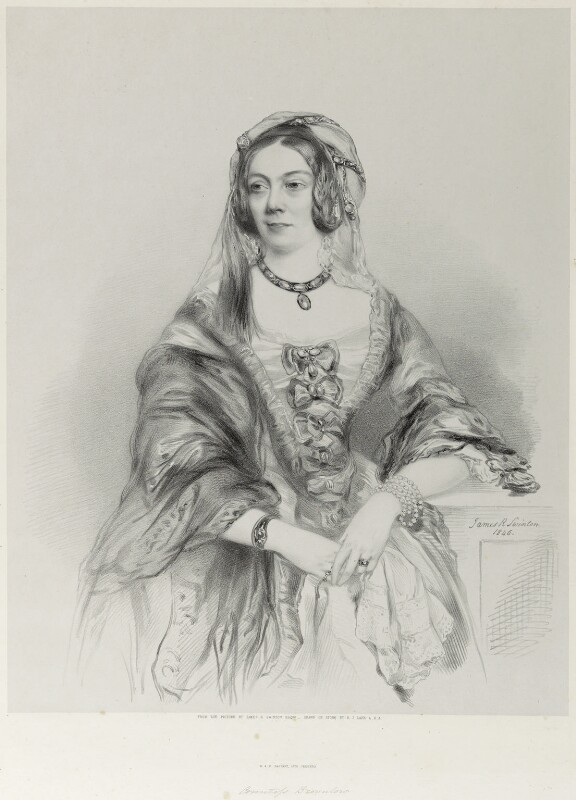From Slight Reminiscences of a Septuagenarian From 1802 to 1815 By Emma Sophia Edgcumbe Cust Brownlow (Countess of)

Reports of battles succeeded each other, all equally unfounded, but on the 19th or 20th, at an evening party at Lansdowne House, much sensation was caused by the report that a great battle had certainly been fought, and that the intelligence had been brought, it was said, by a pigeon to the Rothschilds.
This suspense ended on the 21st . Never shall I forget that evening! Lord and Lady Castlereagh were dining two or three doors from their own house with Mrs. Boehm, to meet the Prince Regent, and I was sitting quietly alone, when suddenly there came the sound of shouting and the rush of a crowd, and running to the window to discover the cause of all this noise, I saw a postchaise and four, with three of the French eagles projecting out of its windows, dashing across the square and to Lord Castlereagh’s door. In a moment the horses’ heads were turned, and away went the chaise to Mrs. Boehm’s; leaving me in a state of excited wonderment, but feeling a conviction that this haste, and the three eagles, and the cheering of the people, announced a victory. Shortly after I received a from Lady Castlereagh, telling me to dress and to join her at Mrs. Boehm’s—this I did quickly.
The ladies had left the dining-room, and I learnt that Major Henry Percy had arrived, the bearer of despatches from the Duke of Wellington, with the intelligence of a glorious and decisive victory of the Allies over the French army, commanded by Bonaparte in person. The despatches were being then read in the next room, to the Prince Regent, and we ladies remained silent, too anxious to talk, and longing to hear more. Lord Alvanley was the first gentleman who appeared, and he horrified us with the list of names of killed and wounded; and such names! great and distinguished in the campaigns of the Peninsula, and become almost household words. There were several for whom I felt a true regard. The Guards, he said, had suffered severely—my brother Ernest was in them, but the fate of a subaltern could not be known! I had wished to hear more, and what I heard stupified me; I could scarcely think or speak.
Presently the Prince came in, looking very sad, and he said, with much feeling, words to this effect: ‘It is a glorious victory, and we must rejoice at it, but the loss of life has been fearful, and I have lost many friends;’ and while he spoke the tears ran down his cheeks. His Royal Highness remained but a short time, and soon after the party broke up; and I must, in justice to Lady Castlereagh, state that the account I read in some book that she went from Mrs. Boehm’s to a ball at Sir George Talbot’s, and spread the news (so heartrending to many) there, was totally false, for immediately on hearing the details from Lord Alvanley, she made me write a note of excuse to Sir George Talbot both for herself and me, as she properly felt that going to a ball under such circumstances was quite out of the question. Lord Alvanley had slipped out of the room, and went to the ball, and he certainly had the credit of having sent half the ladies into fainting fits and hysterics.
I was very anxious to learn something of my brother, and my friends were most kind in going to the Horse Guards and making enquiries respecting him; and they soon assured me that from all they could hear, I might be at ease as to his safety. A few evenings after the 21 st (I forget the exact date) I was sent for by Lord Castlereagh and found him writing despatches to the Duke, and Major Percy in full uniform standing on the opposite side of the table ready to start with them. Lord Castlereagh instantly gave me a long despatch to copy, which I did as fast as I could, standing by his side, feeling very nervous all the while, with Major Percy staring and looking somewhat surprised at seeing me in the character of secretary. So absorbed was I in the mere mechanical act of writing rapidly, that I had no idea of the subject of the despatch; the only words I remembered being ‘Bavarian Contingent.’
Note: Lord Castlereagh was Emma’s uncle:
Lady Emma Sophia Edgcumbe, Countess Brownlow (1791-1872), eldest daughter of Richard Edgcumbe, 2nd Earl of Mount Edgcumbe (1764-1839) and Lady Sophia Hobart (1768-1806), third daughter of John Hobart, 2nd Earl of Buckinghamshire (1723-1793); married in 1828, as his third wife, John Cust, 1st Earl Brownlow (1779-1853), but bore him no children. She had spent her youth trailing around Europe with her uncle, Lord Castlereagh, on his official visits as Foreign Secretary. She held the office of Lady of the Bedchamber to Queen Adelaide between 1830 and 1849 and formed a close relationship with her. The widowed Adelaide came to stay at Belton and a bedchamber was redecorated for the occasion and duly renamed the Queen’s Bedroom. Lady Emma wrote Reminiscences of a Septuagenarian which was published in 1868.